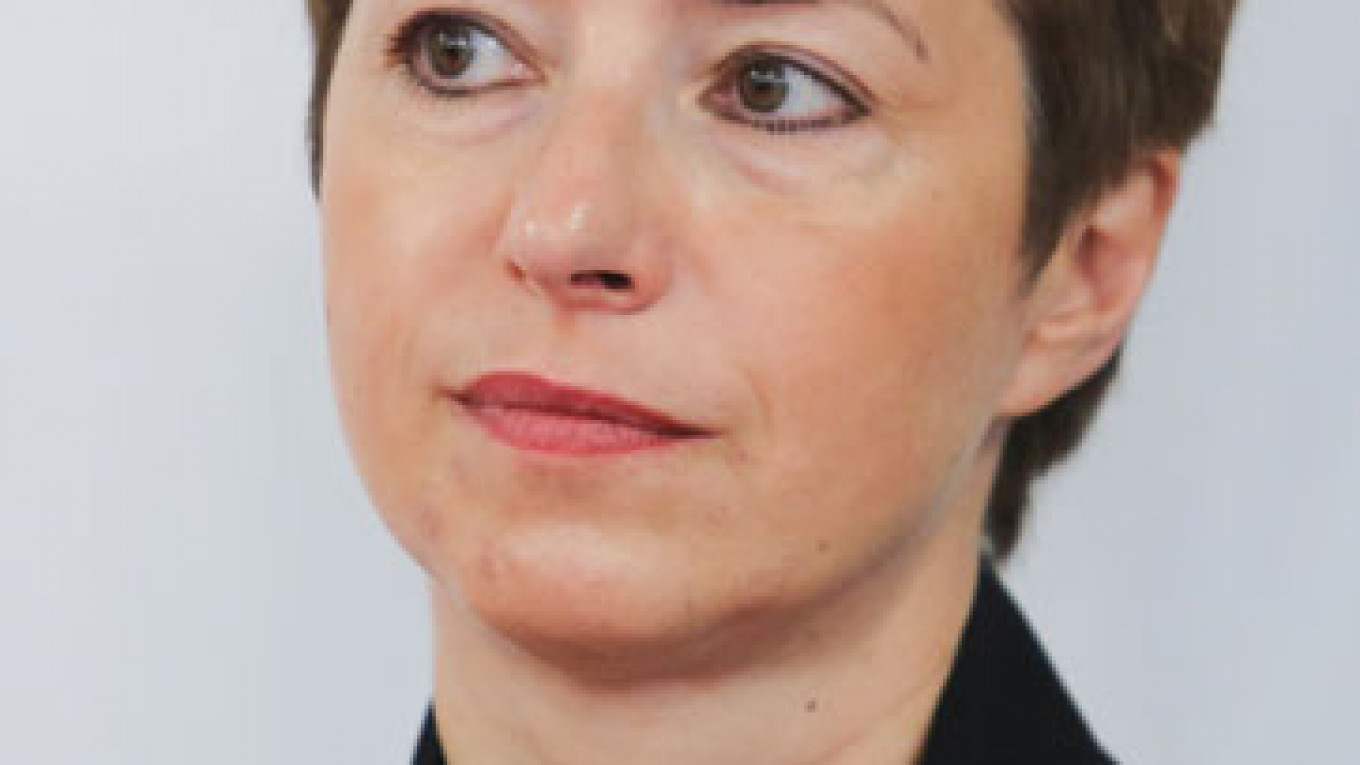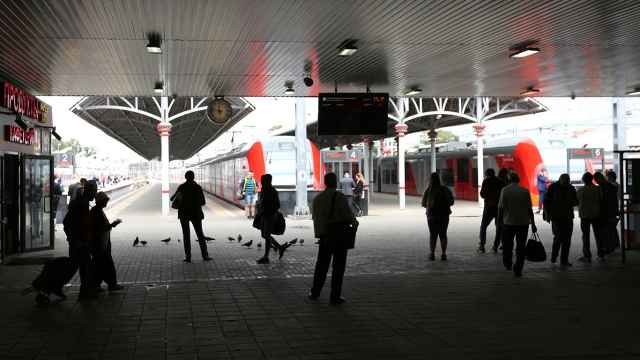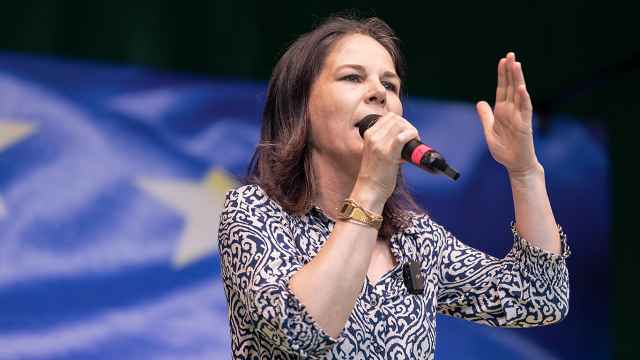As Russia celebrates its women with a profusion of chocolate and flowers this Saturday, The Moscow Times take a look at who represents the so-called "beautiful half" in the highest echelons of government.
Here are ten high-powered women who will be guiding Russia through 2014.
|
Name |
Position |
Career Path |
Personal Life |
Quote |
|
Valentina Matviyenko |
Speaker of the Federation Council |
Graduated with a degree inpharmacology in 1972. Rose through the ranks of the Komsomol, in 1989 becoming chairwoman of the U.S.S.R's committee on women andprotection of the family. In 1991 completed courses in diplomacy, appointed U.S.S.R and later Russian Ambassador to Malta. In 1997 became Ambassador to Greece; appointed deputy prime minister in1998. Governor of St. Petersburg from2003 to 2011; in 2011 appointed St. Petersburg's senator to the Federation Council and elected chairwoman. |
Born April 7, 1949, inShepetovka, Ukraine. Her father Ivan Tyutin was aveteran, mother Irina was acostume designer. Married toVladimir Matviyenko. She has one son, Sergei, who is thehead of VTB-Development, a subsidiary ofstate-run VTB Bank. |
"I think that, since every society consists of men and women, different opinions, different points of view should also be represented in positions ofpower … Likely women are more emotional, we take things more to heart than men do … But when you hold a high position and you are responsible for one or another domain, you must make the decisions that useful, that are necessary forthe country and for people. Sometimes you have tosuppress these emotions within yourself." In an interview onEcho Moskvy, Oct. 29, 2012. |
|
Elvira Nabiullina |
Head of the Central Bank |
Earned a Ph.D in economics in 1990, from 1992 to 1994 worked on the board of the Russian Union ofIndustrialists and Entrepreneurs. Appointed deputy economic development minister in 1997; chairwoman of the board of directors of Promtorgbank in 1998. Became first deputy economic development minister in 2000. Appointed president of the Center for Strategic Research in 2003. Served as economic development minister from 2007 to2012; appointed presidential advisor in2012 and head of the Central Bank in2013. |
Born Oct. 29, 1963, in Ufa. Her father, Sakhipzad Yabiukkin was a driver, her mother Zuleikha worked in a factory. Married with one son. Her husband Yaroslav Kuzminov is rector of the Higher School of Economics. |
Asked how she feels working with primarily male co-workers:
|
|
Tatyana Golikova |
Head of the Audit Chamber |
Graduated with a degree in labor economics in 1987. Entered theFinance Ministry in 1990 andascended the ranks, in 2002 appointed first deputy finance minister. Served as health and social development minister from 2007 to2012; in 2012 became a presidential aide. Appointed head of the audit chamber in 2013. |
Born Feb. 9. 1966, inMytishchi, Moscow Region. Married toformer Industry and Trade Minister Viktor Khristenko, who is currently chairman ofthe board ofthe Eurasian Economic Commission— theregulatory body of the Russia-led Customs Union. |
Asked if she thinks that Russian women have more difficult lives than European women: "Yes, most likely. We have gotten used to working a huge amount and to taking care of our families seriously. Spending a great deal of time tending to one and the other, we often do not notice that absolutely nothing is left forourselves." |
|
Olga Golodets |
Deputy prime minister, responsible forhealth, education, social services and culture |
In 1984 graduated with a degree ineconomics. Began work as aresearcher on labor issues; in 1999 she became assistant general director for human resources andsocial policy at Norilsk Nickel. In 2001 she was appointed deputy governor ofthe Taimyr autonomous district; in2010 she was appointed deputy Moscow mayor for health andeducation issues; in 2011 she became deputy Moscow mayor forsocial development issues. In 2012 she was appointed deputy prime minister. |
Born June 1, 1962, inMoscow. Married with two children. |
"If we really create more convenient conditions for young women who are striving forprofessional self-realization, then more women will enter business and government. Ofcourse, if we are speaking ofprofessional potential, then women and men in Russia have far from equal conditions; theproblem that we see now — not enough openings inkindergartens — is a serious limitation, above all for women. But this problem is being resolved." In an interview with Ogonyok on Feb. 26, 2014. |
|
Natalya Timakova |
Spokeswoman for Prime Minister Dmitry Medvedev |
Graduated with a degree inphilosophy 1998. From 1995 to 1999 she worked as a political correspondent, first at Moskovsky Komsomolets, then Kommersant, andfinally at Interfax. In 1999 she was appointed then-Prime Minister Vladimir Putin's press secretary. From 2002 to 2008 she served as head of the president's press service, in 2008 she was appointed press secretary to President Dmitry Medvedev. In 2012 she was also appointed deputy head of the government administration. |
Born April 12, 1975, inAlmaty, Kazakhstan. Married toAlexander Budberg, political commentator for the newspaper Moskovsky Komsomolets. |
"In America there is a long history of public politics; wives always played a very important role in election campaigns andother events … Perhaps theRussian people, are still not completely ready for that. We see the role of women more traditionally: housewife, mother, wife — someone who provides a secure homestead. This is not bad, it is simply our tradition. Although, I think that changes are already taking place." |
|
Olga Dergunova |
Head of the Federal Property Agency |
Graduated in 1987 with a degree incybernetics; completed post-graduate studies in programming andcomputer engineering in 1991. In 1994 she began work in Microsoft's Moscow office as corporate account manager, rising to president ofMicrosoft in Russia and the CIS — aposition she held from 2004 to 2007 before becoming a vice president atVTB Bank. In 2012 Dergunova was appointed head of the Federal Property Agency. |
Born May 15, 1965, inMoscow. Her father Konstantin Kurbakov was an information technology specialist, her mother was aprogrammer. She is married to Igor Dergunov, CEO of Morskoy Bank. They have one daughter. |
"Definitely. There are skills that can be taught, and then there are natural qualities: charisma, optimism, a positive outlook. Sometimes you just need tohelp people discover these qualities in themselves. Women need to be taught to a greater extent than men do. After all, inRussian society the role ofmother and housekeeper, in the absence of many basic services, distracts women fromprofessional development, andthey need help finding themselves." In an interview with Forbes, March 19, 2010. |
|
Olga Yegorova |
Chairwoman of the Moscow City Court |
In 1972, at the age of 16, she began work in the Moscow courts as courtroom secretary. She graduated with a degree in law in 1982 and in 1983 was appointed a people's judge at a regional court. She continued torise through the city court system, becoming deputy chairman of the Moscow City Court in 1999 andchairwoman in 2001. |
She has one daughter with her late husband Sergei Yegorov, lieutenant general anddeputy head ofthe FSB Academy, who passed away in 2012. |
"It has an effect. But I was lucky with my family. My mother is still alive, 80 years old. When my spouse comes home from work, she quickly makes him something nice and hot. She clears away the plates, and he is satisfied and waits for his wife to come home from work. If he was hungry, can you imagine what would happen?" |
|
Veronika Skvortsova |
Health Minister |
Graduated with a degree in pediatrics in 1983, in 1985 completing post-graduate studies in diseases of the nervous system; earned her PhD in1993, becoming a professor in 1999. In 2004 she was elected associate member of the Russian Academy ofMedical Sciences. In 2005 she went towork as director of a stroke research institute. In 2008 she was appointed deputy health and social development minister and in 2012 took over as head of the ministry. |
Born Nov. 1, 1960, inMoscow to a family ofdoctors. She is married with two children. |
"In the last three years my family has barely seen me. Perhaps because of this they reacted tomy new appointment, shall we say, philosophically." In an interview with Rossiiskaya Gazeta, May 23, 2012. |
|
Anastasia Rakova |
Deputy Mayor of Moscow |
Graduated in 1998 with aspecialization in law and economics. In 1998 she began work in the Khanty-Mansiisk administration; in 2001 she became first assistant to the governor of the Tyumen region; in 2005 head ofthe governor's administration. From2006 to 2008 she worked in the presidential administration. In 2010 she was appointed head of Moscow Mayor Sergei Sobyanin's administration and deputy mayor. |
Born Feb. 8, 1976, in
|
Does not give personal interviews. |
|
Irina Yarovaya |
Head of the State Duma's Security andAnti-Corruption Committee |
Graduated with a degree in law in1998 and in civil service in 2000. She began work in the Prosecutor General's Office, ascending to senior aide to the Prosecutor General of the Kamchatka region. In 1997 she was elected deputy of the Kamchatka region Council of People's Deputies, becoming head of the Yabloko party faction. In 2001 she became amember of the Yabloko party's federal council. In 2007 she left Yabloko forUnited Russia. Later that year she was elected deputy to the State Duma. In 2011 she was again elected to the State Duma, where she became head of the security and anti-corruption committee. |
Born Oct. 17, 1966, inUkraine. Married with two children. |
"If we speak about strength ofcharacter, about will, about therole which she filled for her nation, without a doubt, she was a strong person, a forceful person. For a politician, this is insome sense a model fordefending the interests of one's nation." In an interview with Pozner, April 21, 2013. |
Sources: Vedomosti, Ekho Moskvy
A Message from The Moscow Times:
Dear readers,
We are facing unprecedented challenges. Russia's Prosecutor General's Office has designated The Moscow Times as an "undesirable" organization, criminalizing our work and putting our staff at risk of prosecution. This follows our earlier unjust labeling as a "foreign agent."
These actions are direct attempts to silence independent journalism in Russia. The authorities claim our work "discredits the decisions of the Russian leadership." We see things differently: we strive to provide accurate, unbiased reporting on Russia.
We, the journalists of The Moscow Times, refuse to be silenced. But to continue our work, we need your help.
Your support, no matter how small, makes a world of difference. If you can, please support us monthly starting from just $2. It's quick to set up, and every contribution makes a significant impact.
By supporting The Moscow Times, you're defending open, independent journalism in the face of repression. Thank you for standing with us.
Remind me later.






